Porgs, space horses and sea sirens, oh my: A guide to the creatures of ‘Star Wars: The Last Jedi’ and how they were made

L.A. Times film critics Justin Chang and Kenneth Turan chat about the latest “Star Wars” film, “The Last Jedi,” and agree that director Rian Johnson’s effort is one of the best in the popular franchise. However, they don’t agree on exactly how good
From the crystal foxes of Crait to the Caretakers of Ahch-To to the tiny porgs you love or hate (or love to hate), the alien creatures of “Star Wars: The Last Jedi” leave their own unique mark on the galaxy already filled with Wookiees, wampas, tauntauns, Banthas and Ewoks. As created by writer-director Rian Johnson, each new addition also contributes to an underlying environmental theme that runs throughout the latest addition to the “Star Wars” universe.
“One thing I got to do was go to the Lucasfilm archives and go through Ralph McQuarrie’s original artwork, and the creatures he designed,” Johnson told The Times. “I think you can see some influence in this movie. It reminds me of [Hayao] Miyazaki; it reminds me of how you engage with the natural world.”
That sensibility presents itself in every creature introduced in “The Last Jedi,” in which each alien animal serves a higher purpose in their interactions with our humanoid heroes. (Yes, even those annoyingly adorable porgs.)
Oscar-winning special effects artist Neal Scanlan, a founding member of the Jim Henson Creature Shop who has worked on all of the most recent “Star Wars” films, oversaw the “Last Jedi” creature effects. Scanlan and Industrial Light & Magic creative director Ben Morris, a fellow “Force Awakens” veteran, take us through the newest species in the galaxy far, far away and the blend of practical and computer-generated artistry it took to bring them to life.
Those cute little porgs
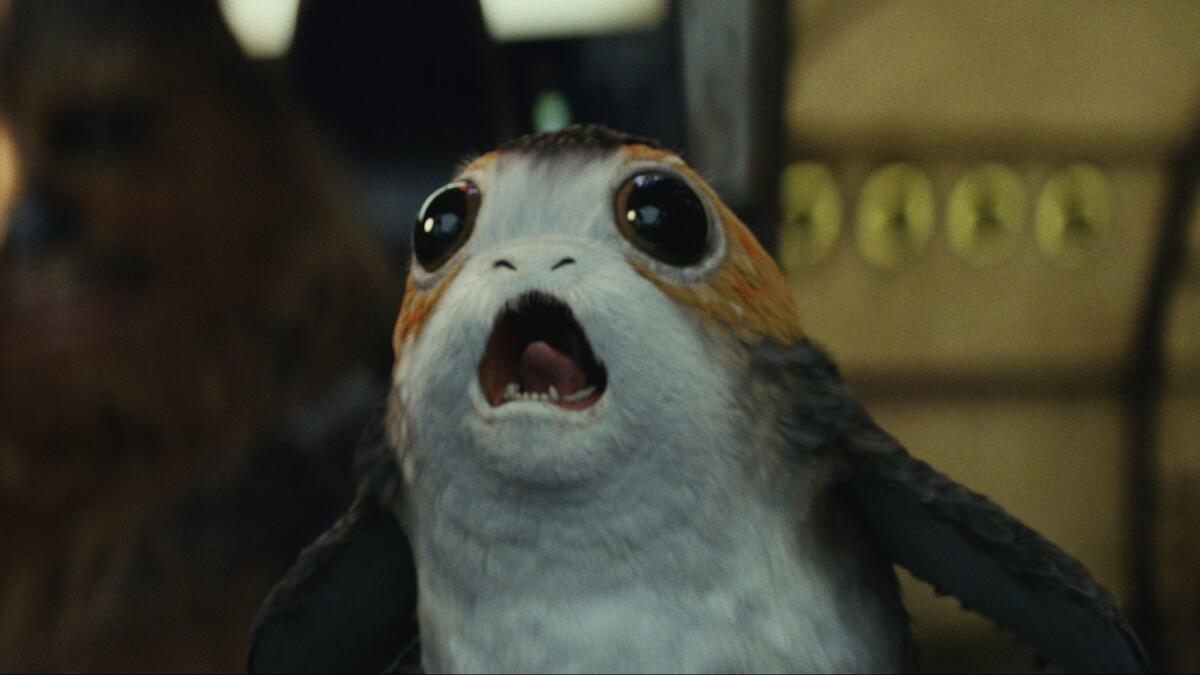
What’s the plural of “porg”: Porgs, porgi? Not even Scanlan is sure. Bow down to “the porg” — as in, resistance to the adorableness of the newest (and most marketable) “Star Wars” critters is futile.
Inspired by the puffin sea birds native to the Irish island of Skellig Michael (which stood in for Ahch-To, Luke Skywalker’s remote Jedi hideout), the furry, feathered porgs of “The Last Jedi” were conceived with the personalities of a pesky but beloved family pet.
“I’m a great animal lover and I do believe that animals have an individual personality unto themselves, and that personality is in a sense brought out by the owner,” said Scanlan, whose team created practical, lifelike puppet porgs that were then animated by a team of VFX artists to give their animatronic bodies flight and movement.
“Dogs can be naughty when they want to be, they can be cheeky, they can be crafty, loud, quiet, whatever. We thought of porgs in those terms. Wouldn’t it be wonderful to have one or some of them in your house? Like Chewie, there would be times when you’d want to pull your hair out — they’re everywhere — but they’re never something that you dislike — inquisitive, annoying, lovable, crafty little critters who just want to be with you.”
The fathiers of Canto Bight
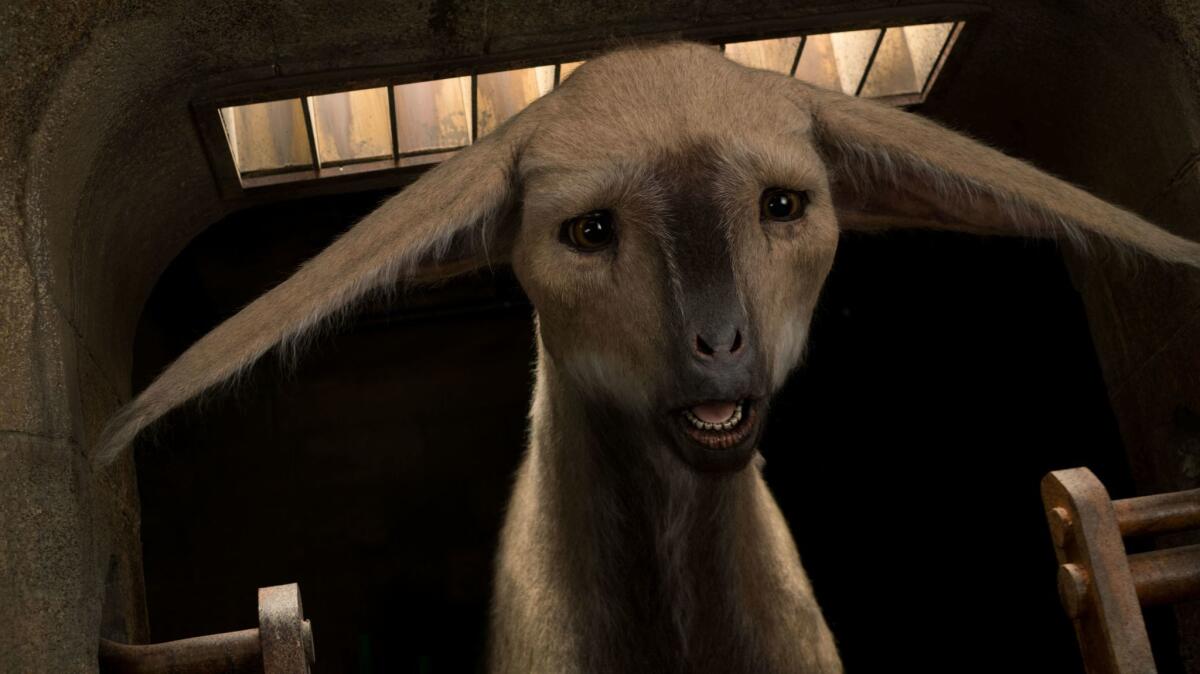
The majestic fathier beasts kept as racing animals on Canto Bight are part horse, dog and cat — towering creatures with big, kind eyes that Rose and Finn encounter during their stop on the casino planet. Mistreated by the Canto Bight one-percenters and exploited for their speed for sport, the fathiers are objects of fascination to Rose, who connects emotionally with one in a scene created with a unique blend of practical and visual effects.
“We felt that we should do that practically,” said Scanlan, whose team created an animatronic fathier for actress Kelly Marie Tran to interact with. “We wanted Rose to have something to touch, and to have something to relate to. I don’t think [Tran] would mind me saying that there was a tear in her eye when she acted that moment. It was like a piece of theater. Very quiet on the set, the creature was hidden in the shadows, and we pushed it forward and moved the animatronics almost to drive and help her acting, but as much to respond to her acting as well.”
“I am very fond of the things that we make,” added Morris, whose team of VFX artists digitally built the fathier to run at speeds of up to 50 mph, animating green-screen footage of Tran and John Boyega riding a practical rig for the final Canto Bight escape sequence. “I think of [the fathiers] as actors and not just visual effects. So much of what we try to do is character-driven, and it’s the same for the fathier. It was very important for the scene when Rose meets them, just like it is when Chewie [meets] the poor little anxious porg. Hopefully that hits many truths with people and you can see there’s an instant fondness or love between the two of them. There’s a lot of friendship and love in this movie.”
The vulptex (crystal foxes) of Crait
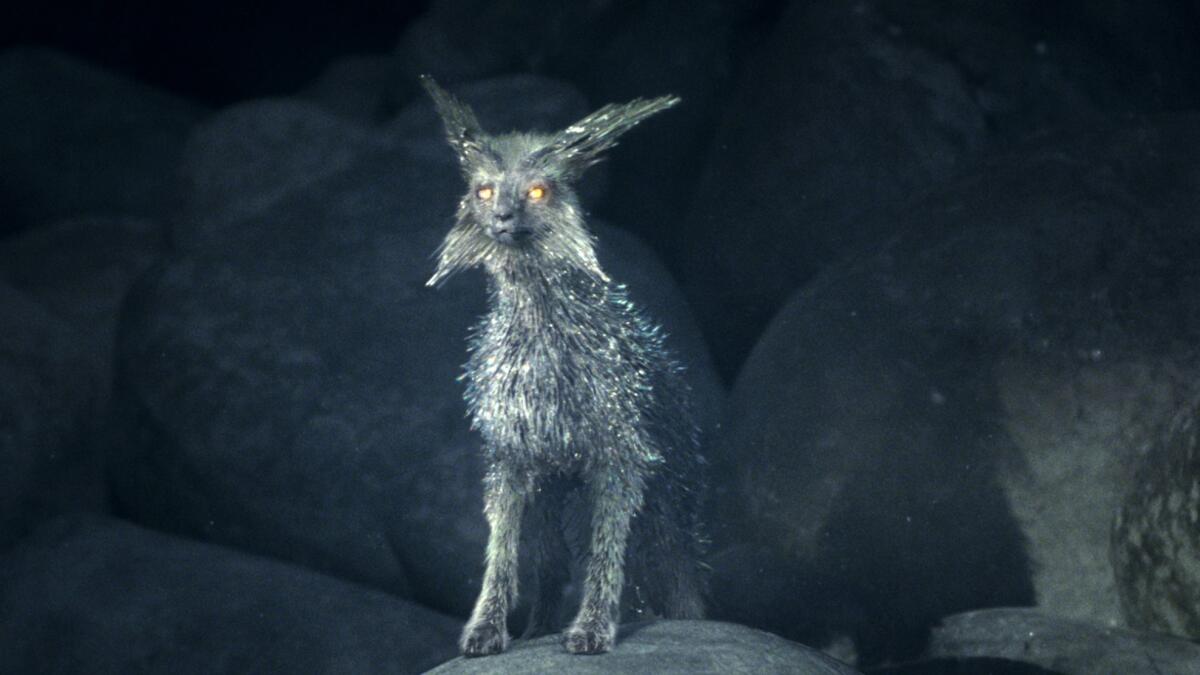
Referred to as “crystal critters” by Finn in the film and by Morris’ team as “crystal foxes,” the vulptex (plural: vulptices) native to the salt planet Crait play an important role in the Resistance’s last stand against the First Order. Featuring crystalline fur after years of surviving off of the mineral planet, their chandelier-like jingling sounds give audible voice to their every movement as the burrowing creatures find their way into the once-abandoned Rebel base where Gen. Leia Organa’s troops find refuge.
The Caretakers
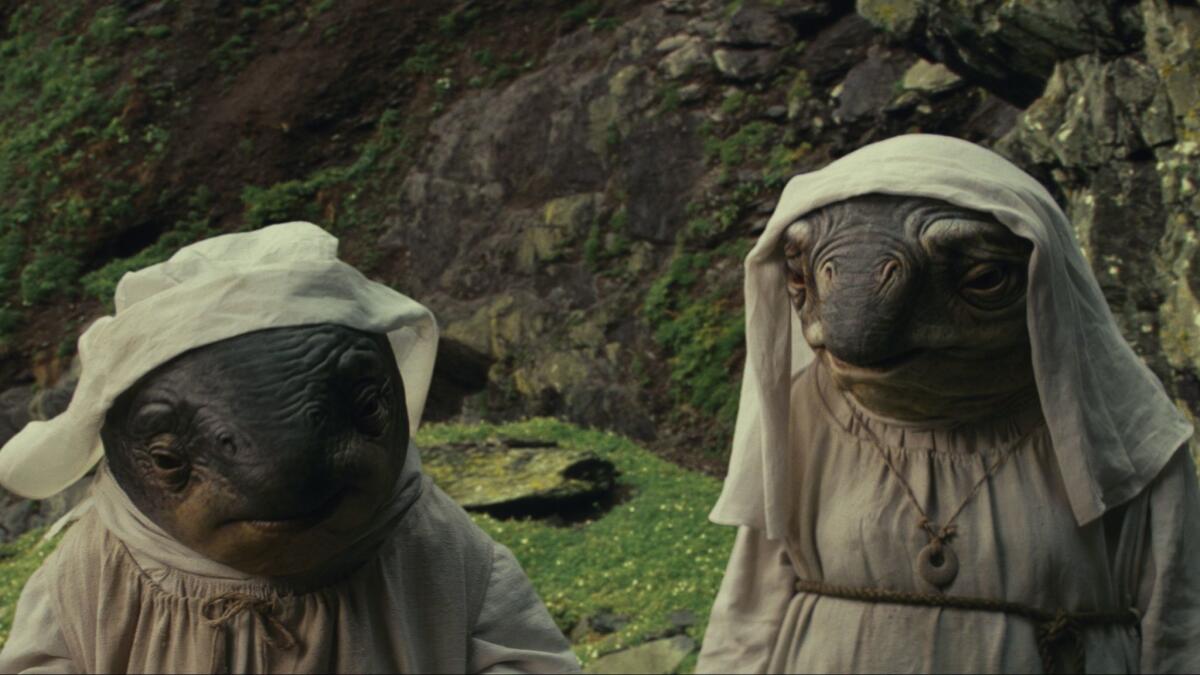
Indigenous to the island of Ahch-To, the fishlike Caretakers look after Skywalker and the Jedi Temple — and they, too, came right out of Johnson’s imagination. “As described by Rian, we imagined there was no other DNA that would have reached this island other than the porg and the Caretakers,” said Scanlan.
Inspired by the real-life monks who once inhabited Skellig Michael, the Caretakers were designed as if they evolved out of the neighboring ocean or reached the remote locale by flight. “They are part of that DNA chain,” Scanlan offered. “The lovely idea of them having little bird feet but having much more fishlike qualities is something we talked about with Rian early on.
“We saw them very much as holy, or religious, nun-like creatures that were very caring, were willing to accept Luke into their world and had grown to love him and care for him. That was the feeling: That they’re the caretakers, the guardians of this island, and they look after its wildlife, the natural foliage, everything — they were there to preserve it and look after it in the future.”
The Thala-sirens
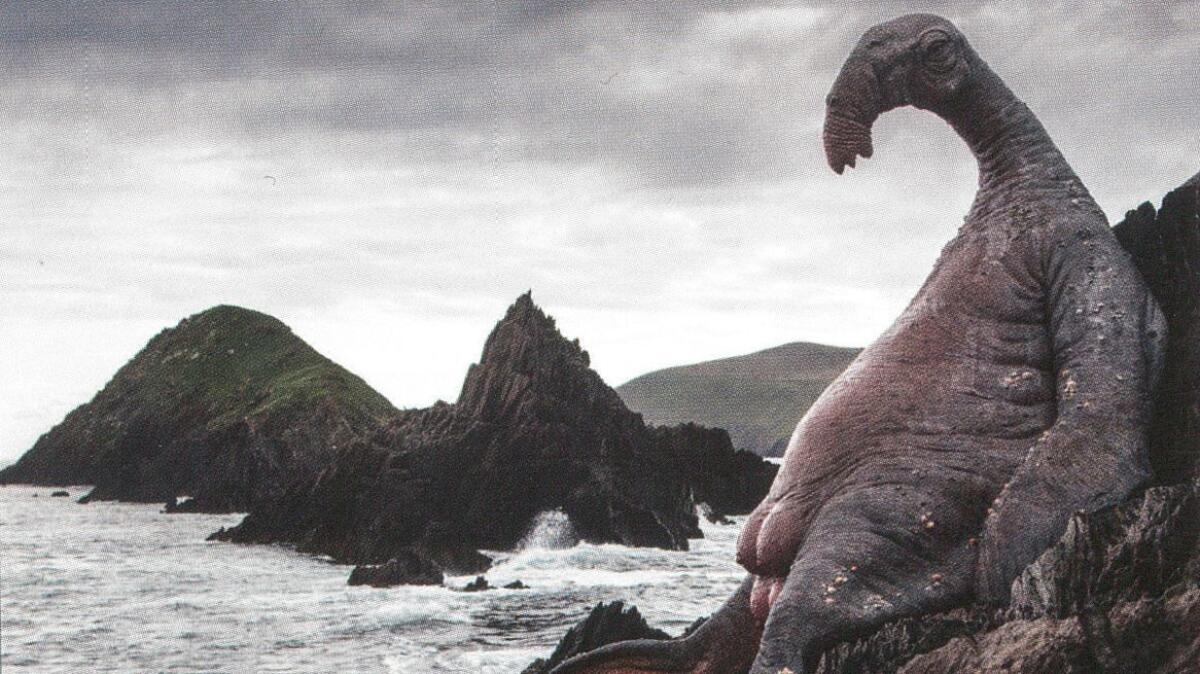
Official canon calls them “Thala-sirens”; Scanlan fondly refers to the gentle giant creature who lives with her brood on the rocky cliffs of Ahch-To as the “sea sow,” one of the most unheralded triumphs in “The Last Jedi.”
“She comes there every day to give milk to [Luke],” explained Scanlan, whose team built a massive 18-foot-tall animatronic version in a soundstage facsimile of the exact island rocks where she perches every morning waiting for Skywalker. “He looks after them; they trust him.”
So committed was the “Last Jedi” team to bringing Johnson’s vision of the Thala-siren to life, they built an animatronic “big enough to fit two humans in” and flew the creature and her babies by helicopter to nestle her along the real cliffs just to shoot the scene. “We estimated that it was just over three-quarters of a ton, right on the edge of what a helicopter’s payload could safely deliver,” said Scanlan. “It was important to us to take these creatures practically to a location and shoot them in their real locations — with the real salt spray, in the real light — and deal with whatever elements threw themselves at us.”
And those green milk-giving teats? Fully functional, Scanlan laughs. “Absolutely. [The milk] was tinted later with CG to make it slightly more disgusting.”
ALSO
‘The Last Jedi’ breakout Kelly Marie Tran on her whirlwind ‘Star Wars’ journey and Rose’s future
Rian Johnson on the evolution of the Force in ‘Star Wars: The Last Jedi’ and more spoilers
Only good movies
Get the Indie Focus newsletter, Mark Olsen's weekly guide to the world of cinema.
You may occasionally receive promotional content from the Los Angeles Times.








